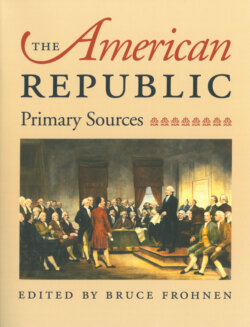Читать книгу The American Republic - Группа авторов - Страница 13
На сайте Литреса книга снята с продажи.
ОглавлениеNo people has a true “beginning.” Just as individuals come from families and neighborhoods, which instill them with certain beliefs and habits from an early age, so peoples come from other places and communities; they do not simply assemble and form themselves out of thin air. But the study of a people’s inheritance must end somewhere. There must come a point at which we say, “Here are the basic, fundamental events and actions that set members of one community on their way to forming another.” With Americans that point is the beginning of formal settlement in the New World.
Settlers brought to America a wealth of traditions, beliefs, habits, and motivations. They did not come to the New World as clean slates, nor did they write upon clean slates in forming new communities. Whether fleeing persecution, seeking wealth, or striving to establish a more godly community, they had to operate within the restrictions established by their charters or grants from the British king. Most obviously, these charters set down what authority would rule over settlers in each colony, whether it was a single proprietor, a governor answerable to the king, or a corporation set up under the king’s auspices that also had to answer to the royal power. But troubles in Great Britain and the difficulties of long-distance travel in an era of wind-powered ships gave the settlers vast leeway in establishing local political, economic, and religious communities. This is not to say that events in Great Britain were irrelevant to those in the New World. The time of settlement was one of great unrest; it included the era of constitutional conflict between King James I and Parliament, followed by the English Civil War (1642–49), which resulted in the beheading of Charles I and was itself followed by more than a decade of dictatorship under Oliver Cromwell and his Puritan army. But settlers in America exercised great freedom in establishing rules by which to govern themselves.
GOVERNING DOCUMENTS
For many centuries, the English people have had a particular faith in the power of the written word, and especially in the power of written documents to establish the means by which they were to be governed. Thus, despite the varying reasons for which English settlers came to America, written documents played a crucial role in the founding of the English colonies. And, despite many differences, these documents share important characteristics: an emphasis on the community’s duties to God and on God’s role as protector and judge of the community; a call on members of the community to serve the public good; and a reliance on written laws to enforce virtue and good order. In addition, by 1638, with the restoration of power to the Virginia House of Burgesses, legislative deliberation and consent were established as central governing principles in the American colonies. Documents in this section include frames of government that spell out how authority and lawmaking power shall be determined and list laws detailing rights, duties, and penalties for law-breaking. They also include more generalized covenants binding communities together in pursuit of a virtuous, religious life as well as more specific acts aimed at establishing workable township governance and securing the loyalty of the governors and the governed.
